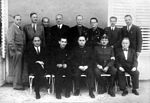This is an old revision of this page, as edited by Norden1990 (talk | contribs) at 22:29, 28 April 2013 (Slovakia since 1993). The present address (URL) is a permanent link to this revision, which may differ significantly from the current revision.
Revision as of 22:29, 28 April 2013 by Norden1990 (talk | contribs) (Slovakia since 1993)(diff) ← Previous revision | Latest revision (diff) | Newer revision → (diff)
| Count Fidél Pálffy | |
|---|---|
 Ministers of the Arrow Cross Party government. Fidél Pálffy is in the second from left of the upper row. Ministers of the Arrow Cross Party government. Fidél Pálffy is in the second from left of the upper row. | |
| Born | Fidél Pálffy de Erdőd (1895-05-06)6 May 1895 Szentgyörgy (Svätý Jur) |
| Died | 2 March 1946(1946-03-02) (aged 50) Budapest |
| Cause of death | Executed |
| Citizenship | Hungarian |
| Known for | Politician and nobleman |
| Title | Minister of Agriculture |
| Political party | Hungarian National Socialist Party Arrow Cross Party |
Count Fidél Pálffy de Erdőd (6 May 1895, Szentgyörgy/Svätý Jur – 2 March 1946, Budapest) was a Hungarian nobleman who emerged as a leading supporter of Nazism in Hungary.
Early life
After service in the First World War he lived on an estate in Czechoslovakia before returning to Hungary, where he was left bankrupt by the Great Depression of 1929.
Pro-Nazi activity
He founded a group called the Hungarian National Socialist Party in 1933 and later merged it with two similar groups under Sándor Festetics and Zoltán Meskó. By 1935 Pálffy had assumed sole control of this group, although it failed to prosper as support drifted to Gyula Gömbös. Devoid of influence, Pálffy turned to Germany and became an agent of the RSHA. Seeking to regain the initiative he worked variously with László Baky and Ferenc Szálasi in an attempt to launch a pro-German party. He finally achieved this goal in 1941 by relaunching the Hungarian National Socialist Party with Baky, although the party was considered conservative when compared to the Arrow Cross Party.
World War II activism and execution
Pálffy was considered to be a suitable candidate to lead Hungary by the SS, although ultimately the choice was not approved. He also became an important contact for Wilhelm Höttl during his work on behalf of the SS in Budapest. Ultimately, as Minister of Agriculture during the period of Nazi dominance, Pálffy was held to be guilty of collaboration and was hanged for treason in March 1946. His execution did prove somewhat controversial however as, beyond his pro-Nazi writings and his membership in Szálasi's government there was little evidence of any crimes he had committed. Nonethelss Pálffy was one of the first members of the government to face trial and so the freshness of case, as well as his status as a member of one of the country's leading noble families, counted against him and so he was sent to the gallows.
References
- ^ Philip Rees, Biographical Dictionary of the Extreme Right Since 1890, Simon & Schuster, 1990, p. 287
- The Politics of Genocide – The Holocaust in Hungary
- Richard Breitman, Norman J. W. Goda, Timothy Naftali & Robert Wolfe, U.S. intelligence and the Nazis, Cambridge University Press, 2005, p. 266
- Istvan Deak, Jan Tomasz Gross & Tony Judt, The Politics of Retribution in Europe: World War II and Its Aftermath, Princeton University Press, 2000, p. 243
| Political offices | ||
|---|---|---|
| Preceded byBéla Jurcsek | Minister of Agriculture 1944–1945 |
Succeeded byImre Nagy |
| Ministers of Agriculture of Hungary since 1848 | |
|---|---|
| Revolution of 1848 | |
| Kingdom of Hungary | |
| Transition period | |
| Regency | |
| Transition period | |
| Communist Hungary | |
| Republic of Hungary | |
| Ministers of Agriculture, Industry and Trade (1848-1889) | |
- Use dmy dates from December 2010
- 1895 births
- 1946 deaths
- People from Svätý Jur
- Hungarian nobility
- Hungarian people of World War II
- Hungarian politicians
- Agriculture ministers of Hungary
- Antisemitism in Hungary
- Hungarian people executed by hanging
- Executed politicians
- Executed Hungarian collaborators with Nazi Germany
- People executed by Hungary by hanging
